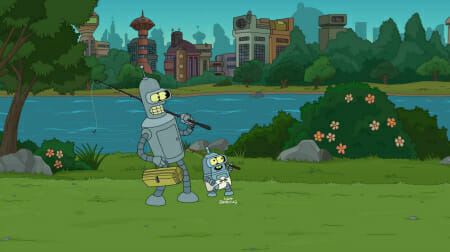Matt Groening’s recent announcement that he has ended Life in Hell felt odd for a number of reasons, chief among them that Groening has never seemed like he wants any of his creations to end. The Simpsons looks to outlive us all at this rate, and Life in Hell until recently looked like it would do the same. If anything, the comic was a successful model of how to age an ongoing work well, though, since unlike The Simpsons, Life in Hell successfully transitioned from being primarily an outlet for Groening’s bitter musings into a more tender comic frequently centered around his family life.
Futurama has been killed repeatedly, and while it’s really David Cohen’s show, it can’t help but feel like some of what’s kept it from dying off has been Groening’s refusal to let his properties end. However, the question that comes to mind at the beginning of the show’s seventh season (if you want to count it that way) is whether Futurama is a show that needs to keep going. Despite being if anything more popular now than it’s ever been, both the movies and the previous season have been more inconsistent than the show’s original run and, what’s worse, have since the show returned to television been far less ambitious.
Then again, maybe there’s nothing wrong with the show coasting for a while, with only occasional spurts of greatness. Last night’s premiere of “The Bots and the Bees” followed by “A Farewell of Arms” featured two enjoyable episodes, neither one particularly wonderful, but both are certainly funny enough to warrant watching. While that may not sound like high praise, that’s still better than most shows on television, which may be enough to warrant its continuation.
The slightly stronger “The Bots and the Bees” centers on the ridiculous but surprisingly well-explained concept of robots raising children. This isn’t the first time the show’s gone to farfetched lengths in order to feature a parent-child relationship (think of Cubert, for starters), nor is it the first time that robots have been given a previously undiscovered trait in order to make them more analogous to humans and thus give Bender a story. So we’re well within familiar ground as far as that’s concerned. The story itself, though, was both well-told and less rote than it sounds in outline, making Bender into a role model parent while his son Ben “Vending” Rodriguez’s mother is the deadbeat. Ben is so cute that it makes this believable, and though the story felt like a mishmash of things we’ve seen before, the jokes at least felt new and hit their marks.
Centering around the imminent end of the world, “A Farewell to Arms” was also a pretty conventional Futurama episode. The show’s had a lot of those, as it should, considering its science-fiction basis, but this one is somewhat obnoxiously based on the 2012 end of the world myth. Here it’s 3012, and no one can leave the planet because electronics have suddenly (there are, of course, exceptions….) stopped working. However, the Martians who predicted this apocalypse left a functional stone rocket ship, i.e. ark like in that terrible movie, that can take some passengers to Mars for survival. When Leela doesn’t get picked, Fry gives her his ticket.
Unfortunately, the plot here is kind of dumb, not that this fully ruins the episode by any extent. Futurama works well when it uses science fiction in order to comment on current attitudes, looking at our point of view and pointing out their ridiculousness through exaggerated context. Here, though, it just takes the movie 2012 and puts it in space. It’s not even really a parody of the movie, either; it just recreates the premise while adding very little commentary about it.
“A Farwell to Arms” is still a pretty funny episode, even though its emotional moments feel forced in comparison with what Futurama has done in the past. This is because unlike Bender’s story in the first episode, in which his attitude toward parenting changes completely once he gets to know his son, here Fry and Leela stay the same as always. That relationship has become one of the main problems that keeps Futurama treading water, since it wants to give its leads strong motivations (and what could be stronger than love) but remains unwilling to let them actually grow as a couple. The moment in which their arms head out towards space is pretty, in a grotesque sort of way, but ultimately meaningless.
Futurama’s premiere wasn’t disappointing, but neither did it signal the show as vital, something really pushing the bounds of comedy anymore. Instead, it looks like this may be another season in which we get a fair number of enjoyably watchable episodes and maybe a couple of great ones sprinkled in. That’s a better fate than what happened to The Simpsons, certainly, but it still feels unfortunate to see a show that used to shoot for the moon (sometimes literally) with every chance it had now taper its ambitions back so drastically.
Stray observations:
•I appreciated them using the Fry’s befuddled meme in the show’s intro.
•”To the employment cave.”
•“We’re being eaten by a giant spider” “There’s no time for that.”
•”Turning quarters into urine” – an amazing new euphemism for drinking.
•”I hate to crush a boy’s dreams, but what the heck.”
•Putting the show’s credits over the opening was a really obnoxious way of doing the premiere. I realize that’s just what Comedy Central does, but that doesn’t make it any less terrible.
•“No way will I let God get my pants.”
•”Is it just me, or is the world ending more often these days?”
•Sharksplosions
•”I wish I could remember with my boobs.”
